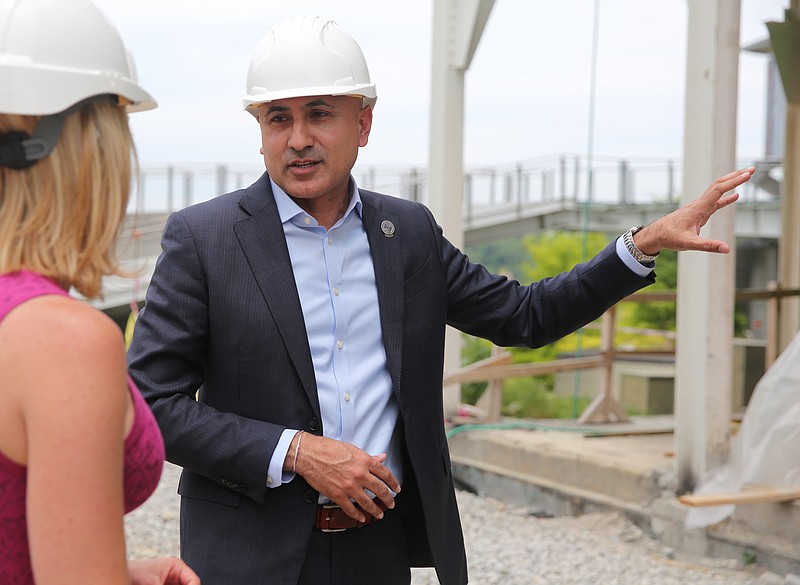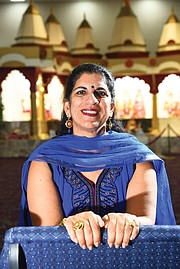Double-Cola is Chattanooga's home-grown soft drink.
One of downtown's newest hotels is the seven-story Holiday Inn and Suites with a Rodizio Grill Brazilian steakhouse on the ground floor.
And a Paisano's Pizza just opened near Hamilton Place mall.
What do these businesses have in common?
They're owned by people from India, or second- or third-generation immigrants from that ancient land of 1.3 billion people.
While Chattanooga's Indian community isn't as high-profile as those in Atlanta or Nashville - both of which have ornate Hindu temples - an estimated 600 to 1,000 Indian families live here.
And they've left their mark on the Scenic City.
"I think there are some impactful Indians that are doing things," said Sheila Boyington, a second-generation Indian who has lived in Chattanooga for 30 years and co-owns the educational software business, Thinking Media/Learning Blade, with her husband, Dane.
Indians here are doctors, engineers and information technology professionals, she said.
They own gas stations - for example, the local chains Harry's and Kanku's - as well as liquor stores and various mom-and-pop businesses.
And they're reshaping Chattanooga's skyline - the Moxy and Edwin hotels under construction downtown both are projects of prominent Chattanoogans of Indian descent.
"One thing about Indians, the work ethic is unmatched. They will do what they need to do to make it successful," said Boyington.
She can reel off the life story of a number of entrepreneurs of Indian descent who live here, from the owners of the city's three Indian food restaurants to the local moguls who own hotel chains.
"I've been in Chattanooga for 30 years and have been very involved," Boyington said. "There's a lot of complexities to the Indian community, as you might imagine."
Meet the Patels
India has 29 states, 22 languages and diverse ethic groups and religions.
"Every state has its own language, its own food, its own culture," Boyington said.
In Chattanooga, she said, most Indians are Gujaratis. That's the name for people from the Gujarat state in western India on the Arabian Sea.
Mahatma Ghandi, the nonviolent leader of India's independence movement, may be the most famous Gujarati.
A familiar name here is Patel, the last name of Gujaratis that are known around the United States as hotel and motel owners.
"A Patel Motel Cartel?" is the title of a 1999 New York Times Magazine article by Indian writer Tunku Varadarajan that delves into how the Patels and other Gujaratis came to own about half of the U.S. motels.
"If you bear in mind that Indians constitute less than 1 percent of America's population, the conquest of this economic niche appears extraordinary," he wrote then. "Look a bit closer and the picture is even more arresting: about 70 percent of all Indian motel owners - or a third of all motel owners in America - are called Patel."
Today, almost half of U.S. hotels (not just motels) are owned by the 16,000 members of the Asian American Hotel Owners Association, says the group whose board of directors are almost all named Patel.
"Potel" is a word that's sprung up in the industry to describe motels and hotels owned by Patels, says a 2016 article about Indian hotel owners in the Commercial Observer, a New York City commercial real estate publication.
The phenomenon is mentioned, the article says, in a 2014 romantic comedy documentary about a U.S. Indian family's effort to get their son to marry, "Meet the Patels."
Patels aren't all related. India's caste system classifies people by their profession, and the last name means farmer or head of the community, by some accounts, or traders employed to calculate tithes owed to medieval kings.
Rags-to-riches for Chattanooga's prominent Patels
The name Patel dominates the wall of charitable donors on brass-and-wood plaques at Chattanooga's Hindu temple and community center, Gujarati Samaj Of East Tennessee (GSET), which is located in a former Baptist church and school complex off Bonny Oaks Drive.
Chattanooga's best-known Patel is Mitch Patel, the founder, president and CEO of Vision Hospitality Group Inc.
It operates more than 60 hotels in nine states and has projects in the works, including the 10/North Apartments, an apartment building near Renaissance Park in North Chattanooga, and The Edwin, a boutique hotel under construction near the Walnut Street pedestrian bridge.
Vision Hospitality's story is rags-to-riches.
Ishwar "Ish" Patel, Mitch's father, only had $8 in his pocket when he came to the United States years ago to study for a doctorate in food microbiology at the University of California, Davis.
Ish Patel grew up in a house with no running water or electricity, walked several miles to school barefoot and studied late into the night by kerosene lamp, according to a history of Vision Hospitality.
The hard work paid off, since he graduated at the top of his class and was the first person in his family to graduate from high school and go to college.
Mitch Patel was 8 when his family moved into an 11-room hotel in Stockton, Calif., while Ish Patel worked as a research scientist at a local pickle factory.
The family ran the motel for three years before Patel's father decided to buy and run a bigger motel that was available across the country in Cleveland, Tenn.
Mitch Patel swore as a youth that he would avoid the hotel business, which had him folding towels and cleaning rooms while his friends went off on family vacations.
But after a stint as a traffic engineer Georgia Department of Transportation in Atlanta, he got drawn back into the family business, discovered it was his passion and built Vision Hospitality with financial backing from investors in the Indian community.
Patel now leads an effort to build a new Hindu temple and community center in Chattanooga in East Brainerd to replace the aging Gujarati Samaj Of East Tennessee.
And each Vision Hospitality hotel has a committee that sees how they can help nonprofit groups.
"When my father came to this country and ultimately settled with our family in Cleveland, we didn't have much," Mitch Patel said. "I don't think anybody handed things out to us, nor did we ask. But we can relate to and appreciate people who have less."
Indian's thrifty, family-oriented business style
Indians are willing to work seven days a week, and they run very lean businesses that often employ family members, Boyington said.
"I think it's pretty typical," she said. "We don't have a lot of extra fluff."
Running lean is true for the Boyington's business, she said, which employs half a dozen people to make and maintain software used in some 3,000 schools.
Indian families are good at working together, Boyington said, and to this day, many children stick with their parents' profession.
That rings true to Saurin Patel, the nephew of Indian-born Chattanoogan Hasmukh "Harry" Patel, the founder of the chain of Harry's gas stations that's grown to 18 outlets in Chattanooga and the surrounding area.
"It's not tough to work with family. We work it out," said Patel, a Chattanooga resident who co-owns some of the Harry's gas stations. Saurin Patel is originally from Gujarat, moved here at age 15 and occasionally travels back to India.
Boyington said a business-like mindset is evident at the U.S.'s largest Hindu temple, the BAPS Shri Swaminarayan Mandir in Lilburn, Georgia, near Atlanta.
It's an ornate structure built from more than 34,000 individual pieces of Indian pink sandstone, Turkish Limestone, and Italian marble that were carved by hand in India, shipped here and assembled like a giant 3-D puzzle, the temple's website says.
The temple supports itself through such enterprises as catering Indian food, Boyington said.
Indians 'loving and friendly'
As a second-generation Indian who grew up in the United States, Boyington has a foot in both worlds.
She comes from a prominent Indian family from the country's largest city, Mumbai, formerly Bombay. One of Boyington's relatives founded the Economic Times, one of the world's most-read English-language newspapers.
Her Anglo-American husband, Dane, is a devotee of Hinduism. The couple travel to India, including a recent family trip when Indians on the street posed for photos with Dane's brother because they thought he looks like Colonel Sanders of Kentucky Fried Chicken fame. KFC is a popular fast food restaurant in India, Boyington explained.
Family is important in India.
"In India, people still live together as a family," she said.
Many Indian business people travel back to their mother country for long trips, especially during the winter.
While such factors as heavy traffic and air pollution can make it hard to live in India, Boyington said, life can be hard in the United States because it's lonelier here.
"If you live in India, every two minutes, there's somebody knocking on the door," she said. "Their life is very full. People are so loving and friendly."

